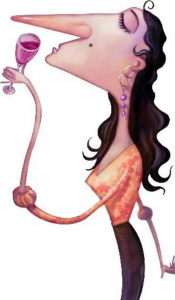There really is no justification for being a wine snob, not even (maybe especially even) if you know a little bit about wine. If you are a wine expert, it’s still not excusable to be a snob because the whole idea of snobbery is to make others around you feel small. What you do in the privacy of your own home is your business; snobbism should be avoided when visiting tasting rooms in Wine Country.
Let’s say you have entered a tasting room. Who’s there? Anyone accompanying you, a few servers and some other wine tasters. Your significant other is unlikely to be impressed with your vast knowledge. The servers already know a lot about their own wines. And the other guests are strangers who you’ll probably not see ever again. So who is there to be snobbish for?
Courtesy of the Mercury News.
Here are some simple tips for avoiding wine snobbery when you’re out tasting.
- Only ask a question if you want to know the answer. That sounds basic enough, but a true snob is only asking in order to show off when the answer is given. The snob may not even listen to the answer, so eager is he or she to preen. By all means ask questions in order to increase your knowledge or just to add to your pleasure about the wines you’re sipping. But if you already know the answer, don’t ask.
- If you’re trying to confirm you’re understanding, say so. Sometimes you think you know something but you’re not sure. In that case, it’s polite to say, “I think I know, but would you remind me about…”. For example, you might ask, “I think I remember that this vintage softer/ more tannic/ more fruit forward than previous vintages. Is it?” The wine snob would simply pronounce his or her opinion, not ask. But if you’re polite about it the server might reach below the bar for an older vintage for you to compare. Impolite wine snobs might not be invited to try.
- Listen to the answer. Snobs aren’t eager to hear; they are primed to speak as soon as the response to a question begins. Often the answer to a specific question might lead to another question followed by another answer and so on. We call that a conversation. If you are knowledgeable, most servers are happy to converse. Being lectured at is not likely to increase their interest in serving you.
- Talk to others like you talk with friends. A lot of wine snobbery is attitude rather than words or actions. It’s hard to look down your nose and sip at the same time. If you are in discussion with someone who really knows wine, keep your tone conversational, the same way you would with a loved one or a friend. If another guest asks what you think of a wine, give simple answers in plain English until you have reason to believe that the other person knows enough wine lingo to start using it yourself.
